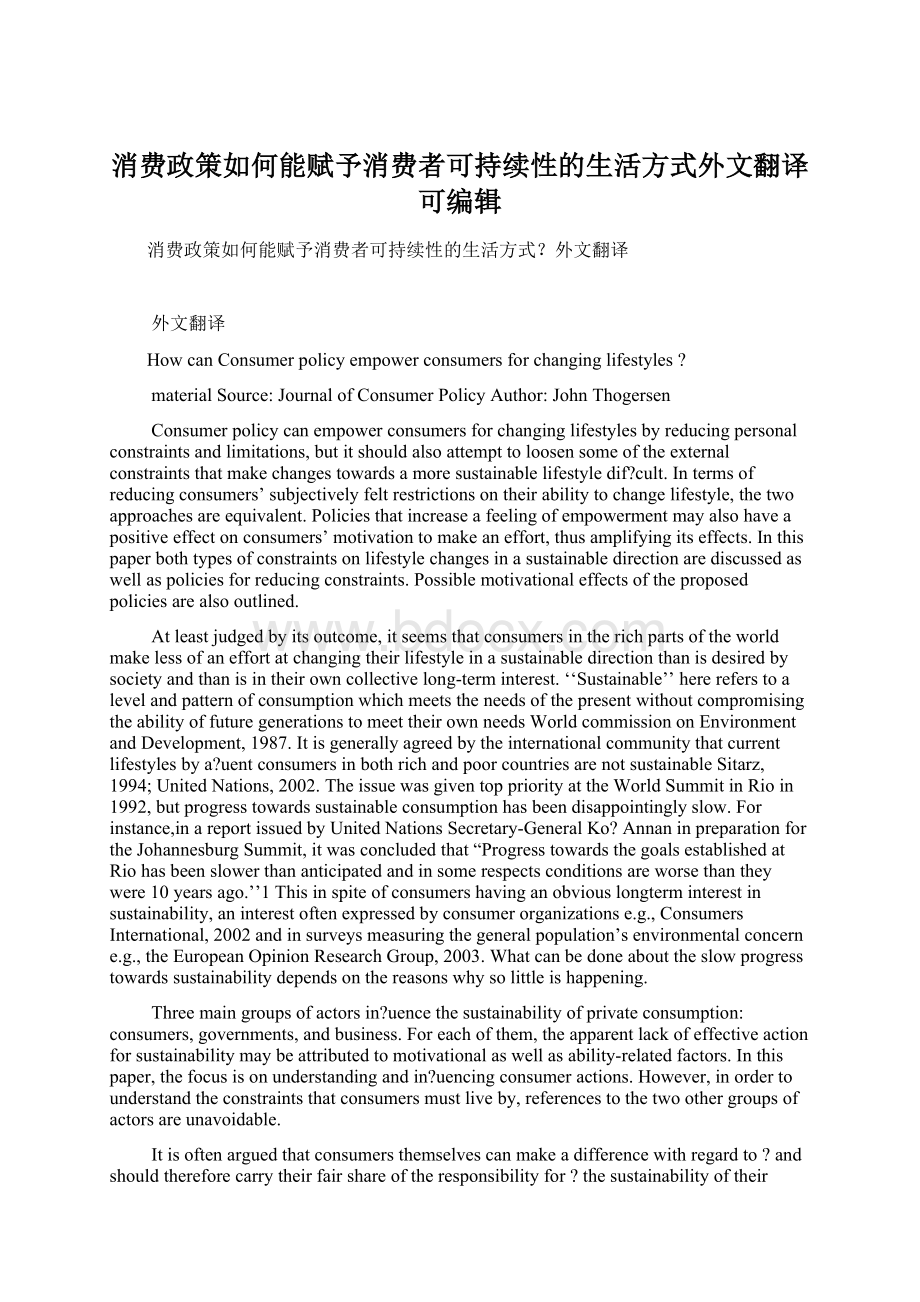消费政策如何能赋予消费者可持续性的生活方式外文翻译可编辑.docx
《消费政策如何能赋予消费者可持续性的生活方式外文翻译可编辑.docx》由会员分享,可在线阅读,更多相关《消费政策如何能赋予消费者可持续性的生活方式外文翻译可编辑.docx(6页珍藏版)》请在冰豆网上搜索。

消费政策如何能赋予消费者可持续性的生活方式外文翻译可编辑
消费政策如何能赋予消费者可持续性的生活方式?
外文翻译
外文翻译
HowcanConsumerpolicyempowerconsumersforchanginglifestyles?
materialSource:
JournalofConsumerPolicyAuthor:
JohnThogersen
Consumerpolicycanempowerconsumersforchanginglifestylesbyreducingpersonalconstraintsandlimitations,butitshouldalsoattempttoloosensomeoftheexternalconstraintsthatmakechangestowardsamoresustainablelifestyledif?
cult.Intermsofreducingconsumers’subjectivelyfeltrestrictionsontheirabilitytochangelifestyle,thetwoapproachesareequivalent.Policiesthatincreaseafeelingofempowermentmayalsohaveapositiveeffectonconsumers’motivationtomakeaneffort,thusamplifyingitseffects.Inthispaperbothtypesofconstraintsonlifestylechangesinasustainabledirectionarediscussedaswellaspoliciesforreducingconstraints.Possiblemotivationaleffectsoftheproposedpoliciesarealsooutlined.
Atleastjudgedbyitsoutcome,itseemsthatconsumersintherichpartsoftheworldmakelessofaneffortatchangingtheirlifestyleinasustainabledirectionthanisdesiredbysocietyandthanisintheirowncollectivelong-terminterest.‘‘Sustainable’’herereferstoalevelandpatternofconsumptionwhichmeetstheneedsofthepresentwithoutcompromisingtheabilityoffuturegenerationstomeettheirownneedsWorldcommissiononEnvironmentandDevelopment,1987.Itisgenerallyagreedbytheinternationalcommunitythatcurrentlifestylesbya?
uentconsumersinbothrichandpoorcountriesarenotsustainableSitarz,1994;UnitedNations,2002.TheissuewasgiventoppriorityattheWorldSummitinRioin1992,butprogresstowardssustainableconsumptionhasbeendisappointinglyslow.Forinstance,inareportissuedbyUnitedNationsSecretary-GeneralKo?
AnnaninpreparationfortheJohannesburgSummit,itwasconcludedthat“ProgresstowardsthegoalsestablishedatRiohasbeenslowerthananticipatedandinsomerespectsconditionsareworsethantheywere10yearsago.’’1Thisinspiteofconsumershavinganobviouslongterminterestinsustainability,aninterestoftenexpressedbyconsumerorganizationse.g.,ConsumersInternational,2002andinsurveysmeasuringthegeneralpopulation’senvironmentalconcerne.g.,theEuropeanOpinionResearchGroup,2003.Whatcanbedoneabouttheslowprogresstowardssustainabilitydependsonthereasonswhysolittleishappening.
Threemaingroupsofactorsin?
uencethesustainabilityofprivateconsumption:
consumers,governments,andbusiness.Foreachofthem,theapparentlackofeffectiveactionforsustainabilitymaybeattributedtomotivationalaswellasability-relatedfactors.Inthispaper,thefocusisonunderstandingandin?
uencingconsumeractions.However,inordertounderstandtheconstraintsthatconsumersmustliveby,referencestothetwoothergroupsofactorsareunavoidable.
Itisoftenarguedthatconsumersthemselvescanmakeadifferencewithregardto?
andshouldthereforecarrytheirfairshareoftheresponsibilityfor?
thesustainabilityoftheirconsumptionpatterne.g.,NorwegianMinistryofEnvironment,1994;Sitarz,1994.Thisisbasedontheobservationsthatprivateconsumptionaccountsforalargeshareofresourceuseandoftheemissionofpollutantstotheenvironment,andthatconsumersdohavesomediscretionarypowerwithregardtothesizeoftheirindividualcontributiontoresourceuseandpollutione.g.,Olander&Th?
gersen,1995.Inlinewiththisreasoning,HansenandSchrader1997arguethatconsumerpolicy,andtheconsumermodelonwhichitisbased,shouldberevisedtore?
ectthatconsumershavean,atleastpartial,ethicalresponsibilityfortheconsequencesoftheiractions.
Althoughthecaseforconsumerresponsibilityisstrong,itisimportantthatitisnotusedtojustify‘‘blamingthevictim’’strategies,thatis,blamingconsumersforunsustainablelifestyleswhen‘‘macroconditionsexistwhichcanbeblamedforcontributingtotheproblemorconstrainingtheeffectivenessofindividualeffortse.g.,companiesthatdonotprovideecologicallyfriendlyproducts,governmentinactivity’’Roberts&Bacon,1997,p.89.Infact,hardlyanyonewilldenythatthereareexternalconditionsaffectingtheeffectivenessofanindividualconsumer’sactions,ifandwhenheorshestrivesforsustainability.Therelevantexternalconditionsareanextremelydiversesetoffactors,perhapstheironlycommonalitybeingthatontheirown,individualconsumerscandonothingaboutthem.
Somerelevantexternalconditions,suchastheclimate,evengovernmentsandindustrycandolittleaboutandothers,suchasculture,citylayout,andinfrastructure,theycanonlyin?
uenceinthelongrun.However,thereareotherimportantexternalconditionswhichgovernmentsand/orindustrycontroltoamuchhigherdegree,suchasthequalityofpublictransport,thesupplyandrelativepricesofenvironment-friendlyproducts,andtheavailabilityanduseofeco-labellingschemes.Hence,governmentsandbusinessesareresponsibleformuchoftheexternalconditionslimitinganindividualconsumer’sfreedomtochooseandact,andthereforetheyalsocarrypartoftheresponsibilityforsustainableconsumptionandproductione.g.,Stern,Dietz,Ruttan,Socolow,&Sweeney,1997.Mostgovernments,2atleastintheindustrializedcountries,alsoacknowledgetheirresponsibility.However,analysesoftheirpraxisrevealthatalthoughsomegovernmentsdobetterthanothers,ingeneralgovernments’verbalcommitmentasexpressed,forinstance,atinternationalconferencesandsummitsisonlyreluctantlyandtoalimitedextendtransformedintoactione.g.,Lafferty&Meadowcroft,2000.
Theeffortalsodependsontheconsumer’smotivation,andnotallconsumersareequallymotivatedtochangetheirlifestyleinasustainabledirection,ofcourse.Somearesoengulfedbytheirownprivatelifeprojectsthattheyhavenoroomforconcernfortheenvironmentorothersocietalproblemsandmanywouldhatetogiveupspeci?
cenvironmentallyharmfulpractices,suchasdrivingagasguzzlingSUVorvisitingfar-awayvacationspotsbyairplane.BothEuropeanTh?
gersen,forthcomingandNorthAmericanDunlap,2002opinionpollsstronglysuggestthatthelevelofenvironmentalconcerniscurrentlynotthemostimportantlimitingfactorforchangingtheconsumptionpatterninasustainabledirection,however.AsIwillarguelater,afeelingofhelplessnessoratleastlackofself-effcacywithregardtosolvingtheproblemsseemstobeofgreaterimportanceforthelevelofindividualmotivation.Therefore,themainfocushereisonconstraintsthatmightlimitconsumers’abilitytoadoptasustainablelifestyleandonwaystoreduceimportantconstraints.
Aconsumerempowermentapproachtoconsumerpolicyischaracterizedbyastrongfocusonreducingconstraintsattheindividuallevel.3Althoughthismakesalotofsensealsowhenthegoalistochangelifestylesinasustainabledirection,theoptionsarewider.Inparticular,consumerpolicyshouldalsoattempttoloosenexternalconstraintsandtoremove‘‘perverse’’incentivesMyers&Kent,1998thatmakechangestowardsamoresustainablelifestylediffcult.Intermsofreducingconsumers’subjectivelyfeltrestrictionsontheirabilitytochangelifestyleandtheirperceivedself-effcacy,thetwoapproachesindividuallyandexternallyfocused,respectivelyareequivalent.Ifpartofwhatislackingismotivation,italsoseemsreasonabletospeakaboutmakingtheconsumerempoweredtoful?
lhisorherresponsibilities.Inthisperspective,empowermentisnotonlyaquestionofcapabilities,butalsoofmotivation.Basically,aperson’sfeelingofempowermenthasimplicationsforhowhardheorshewillstrivetosolveenvironmentalandethicalproblemsthroughhisorherownbehaviouralefforte.g.,Ajzen,1988;Geller,1995;Guagnano,Stern,&Dietz,1995;Olander&Th?
gersen,1995.Hence,policythatincreasesafeelingofempowermentorself-effcacymayalsohaveapositiveeffectonconsumers’motivationtomakeanefforte.g.,Pelletier,Dion,Tuson,&Green-Demers,1999,thusproducingactivationthatgoesbeyondthatdirectlyattributabletoloosenedconstraints.
InthispaperIhavereviewedevidenceregardingtheneedforconsumerempowerment,andhowconsumerpolicycanassistinempoweringconsumersforamoresustainablelifestyle.Theevidencesuggeststhatalthoughindividualconsumers?
especiallyintheindustrializedworld?
havesomediscretionarypowerovertheirconsumptionpatternandalthoughcurrentlifestylescontributetoresourcedepletionandenvironmentaldegradation,limitedabilitiesandrestrictedopportunities,incombinationwithnormsandincentivessupportingnon-sustainablepractices,makeitdiffcultevenforhighlymotivatedindividualstodoanythingradicaltoimprovethesustainabilityoftheirlifestyles.Andwhenitcomestotheimplementationoflawsandregulationsmakingstructuralconditionsmoreconducivetosustainableconsumptione.g.,introducingenvironmentaltaxes‘‘thescaleofchangehasfallenwellshortoftherhetoric’’Lafferty&Meadowcroft,2000,p.381,asitwasputinonethoroughanalysisofgovernmentpoliciesinnineoftherichestcountriesintheworld.Hence,appealstoindividualconsumerresponsibilityinthisareaeasilygeta?
avourof‘‘blamingthevictim.’’
Still,inajointeffortwheregovernmentsandbusinessesalsodotheirpart,empoweringconsumerstoovercometheirpersonallimitationsaswellastobemoremotivatedandinitiating,isundoubtedlyavaluable,probablyevenindispensable,partofanoverallstrategyforachievingamoresustainableconsumptionpattern.Theevidencepresentedabovepointedatmanythingsthatc